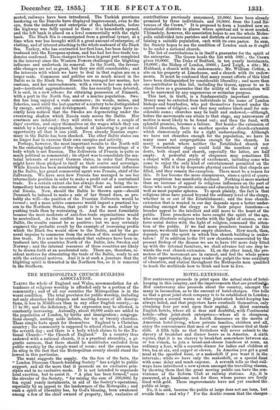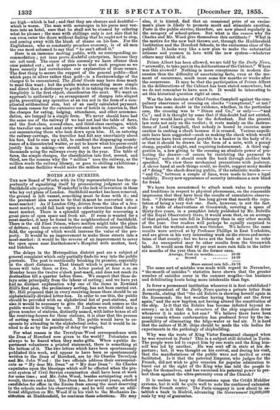HOTEL,EXTENSION.
HOT controversy proceeds in print upon the actual state of hotel- keeping in this country, and the improvements that are praotioabki. Hot controversy also proceeds about the country, amongst the many in locomotion, as to the amount of hotel-charges. One tells us that a great joint-stook company is to be established in London; whereupon a second warns us that joint-stock hotel-keeping has always failed, and that projectors have overbuilt themselves, only obtaining four per cent upon their capital. A third contrasts English hotels, where all is dear and doubtful, with Continental hotels—often joint-stock enterprises—where all is cheapness, civility, and regularity. A fourth discourses on the merits of American hotel-living, where private families, children and all, enjoy the conveniences that men of our upper classes find at their club. A fifth tells us that Britishers will never submit to the slavery of breakfast and dinner hours as in America. A sixth rejoins, that it is no slavery to breakfast somewhere between six or ten o'clock, to join a bread-and-cheese luncheon at noon, an ordinary a four, with a separate dinner for ladies and children at two, tea at six, and supper at eleven. in America you get a good meal at the specified hour, or a makeshift if you want it indie , intervals; while we have only the makeshift, or a special feast with some delay and much expense. A seventh tells us that rail- ways have introduced a new system amongst the travelling classes, , by showing them that the great moving public can have the con- venience of the Reform Club at railway stations. Ay, it is answered, at a handsome cost for those whose purses are freely lined with gold. These improvements have not yet reached the. public at large.
No, it is said, because the public at large does not use inns, but avoids them ; and why P For the double reason that the. chargei are high—which is bad ; and that they are obscure and doubtful— which is worse. The man with sovereigns in his purse may ven- ture into an hotel, sure that he shall not be shamed by ordering what he pleases ; the man with shillings only is not sure that he can even enter the doors without finding that he ought not to stop, and coming away with the blush of shame on his face. For the Englishman, who so constantly preaches economy, is of all men the one most ashamed to say that "he can't afford it." Here is an immense moving public, with no corresponding ac- commodation ; yet inns prove doubtful enterprises, because they are not used. The cause of this anomaly we have oftener than once pointed out ; and it appears to us that such progress as we have recently had corroborates our explanation of those causes. The first thing to secure the support of the general public—that which pays in silver rather than gold—is a foreknowledge of the charges to be encountered. The Hotel Guide may have done much to meet this want ; but the public wishes something more simple and direct than a dictionary to guide it in taking its ease at its inn. Simplicity is the first object, classification the next. We want an approach to uniformity ; an arrangement of charges into aliquot parts, presenting any operation at an inn not in the form of a com- plicated arithmetical sum, but of an easily calculated payment. One main reason for the extensive use of hotels in America is, that the charges for eating, lodging, attendance, and other accommo- dation, are lumped in a simple form. We never should have had the same use of the railway if we had not had the table of fares, and the first-class, second-class, and third-class carriages, which the traveller can select and enter without much trouble, or with- out encountering those who look down upon him.. If, on entering the railway-carriage, the traveller had felt any uncertainty about his fare, had to sum up a bill, to confront the disparaging counte- nance of a discontented waiter, or not to know what his purse could justify him in asking—we should not have seen hundreds of thousands using the railways every day in the year. The table of fares, the simple charges, the classification into first, second, and third, are the reasons why the " million" uses the railway, as the million reads the railway library, or goes to shilling exhibitions ; and the same facilities would make the million use the inn.



































 Previous page
Previous page